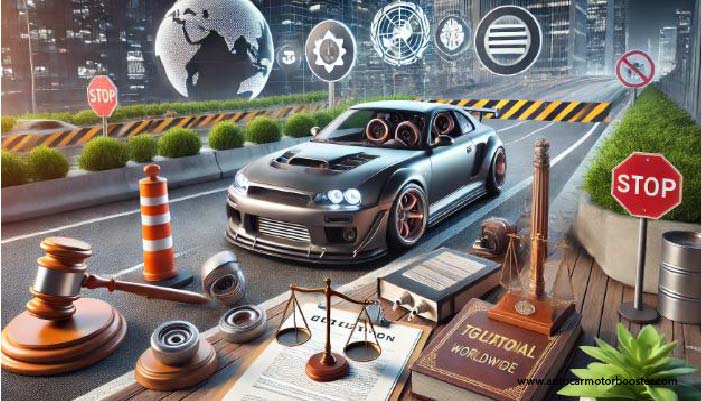The increasing popularity of boosted vehicles—modified cars and trucks with enhanced performance—has revolutionized the automotive industry. From street racers to off-road enthusiasts, modifications offer thrill and functionality. However, with great power comes great responsibility. Understanding the legal implications of modifying vehicles is essential for avoiding fines, maintaining safety, and complying with international regulations. This guide delves into the global legal framework surrounding boosted vehicles, addressing key concerns for enthusiasts and professionals.
Table of Contents
ToggleWhat Are Boosted Vehicles?
Boosted vehicles typically refer to cars or trucks modified to improve performance, speed, or aesthetic appeal. Common upgrades include turbochargers, exhaust systems, suspension lifts, and custom lighting. While these modifications enhance driving experiences, they often push vehicles beyond the original specifications, raising legal and safety questions.
Key Legal Considerations for Boosted Vehicles
1. Regulatory Compliance
Each country imposes unique regulations on vehicle modifications. In the United States, the Environmental Protection Agency (EPA) monitors emissions, and modifications must comply with the Clean Air Act. Similarly, European Union countries enforce the Euro Emissions Standards. Failure to comply with these regulations may result in heavy fines or even vehicle confiscation.
2. Safety Standards
Safety is a top priority for lawmakers worldwide. Vehicle modifications must not compromise the integrity of critical systems like brakes, steering, or airbags. For instance, suspension lifts exceeding legal limits may increase rollover risks. Countries like Australia and Canada have strict laws on tire sizes and height adjustments.
3. Insurance and Liability
Modifications can significantly impact insurance premiums. Unreported upgrades might void policies, leaving owners liable for damages. In Japan, insurers often require detailed documentation of every modification to assess risks accurately.
4. Noise and Emissions
Exhaust modifications are a common target of legal scrutiny. Many jurisdictions, such as California, enforce decibel limits on exhaust noise. Additionally, emission laws restrict the use of components like catalytic converter bypasses, which increase pollutants.
5. Registration and Inspections
In countries like Germany, boosted vehicles undergo periodic inspections (TÜV) to ensure compliance. Failing to register modifications can result in penalties. Even aesthetic upgrades like undercarriage lighting or tinted windows might require approval in some regions.
Tips for Staying Legal with Boosted Vehicles
- Research Local Laws: Regulations vary significantly between countries and states.
- Document Changes: Keep detailed records of all modifications for insurance and inspection purposes.
- Consult Professionals: Work with certified mechanics to ensure compliance.
- Use Approved Parts: Only install parts that meet regulatory standards.
- Regular Inspections: Schedule inspections to identify potential compliance issues.
Benefits of Legal Compliance
Ensuring compliance not only avoids penalties but also ensures safety and resale value. Properly registered modifications can even enhance a vehicle’s market appeal. Legal compliance builds trust between enthusiasts, manufacturers, and regulatory authorities, fostering a positive culture around boosted vehicles.
FAQs about Legal Considerations for Boosted Vehicles
1. Are performance-enhancing modifications illegal?
Performance modifications are legal in most regions if they comply with safety and emissions standards. Always check local regulations.
2. How do exhaust modifications affect legality?
Exhaust modifications must meet noise and emission limits. For example, California restricts exhaust noise to 95 decibels.
3. Can modifications void my car insurance?
Yes. Failing to report modifications may lead to policy cancellation. Always inform your insurer about upgrades.
4. Do aesthetic modifications require approval?
In some countries, modifications like window tinting or custom lights need approval to ensure they don’t hinder safety.
5. How can I check if my modifications are compliant?
Consult local transport authorities or professional inspectors to verify the legality of your modifications.
Conclusion
Owning a boosted vehicle is an exhilarating experience, but it comes with legal responsibilities. By understanding and adhering to regulations, enthusiasts can enjoy their vehicles while ensuring safety and compliance. Whether you’re upgrading for speed, aesthetics, or functionality, always prioritize legal considerations to avoid unwanted consequences.
